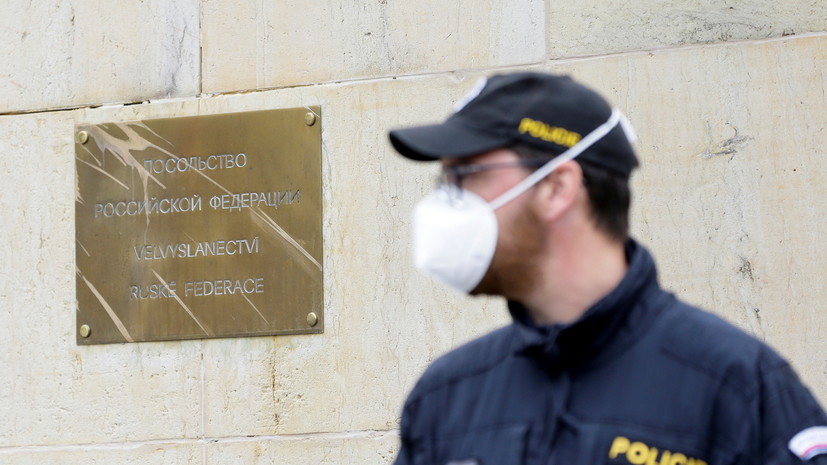The City Court in Prague ruled on the detention of the Russian citizen Alexander Franchetti, who was detained at the airport in the capital of the Czech Republic at the request of Ukraine.
This was reported to RT by the mother of the Russian Bela Dzhalaeva.
According to the woman, representatives of the embassy called her and said that her son would be in prison for at least two weeks.
As Dzhalayeva explains, the lawyer appealed against the arrest decision, the appeal will be considered by the Supreme Court.
“They will not send him to Ukraine yet.
In two weeks they will decide - to leave him at liberty, in a prison in the Czech Republic, or to send him to Ukraine, ”Dzhalayeva told RT.
Until the appeal is considered, according to media reports, the Russian will be in the Prague prison Pankrats.
Accused of terrorism
Earlier, RT talked about the detention of Russian citizen Alexander Franchetti at the Prague airport on September 12 on the basis of an international arrest warrant issued by Ukraine.
The man, along with his daughter Dia Franchetti, was heading to Moscow.
According to the girl, her father was detained on "charges of terrorism in Ukraine."
According to media reports, Franchetti is accused of creating militarized or armed formations that are not provided for by law (Article 260 of the Criminal Code of Ukraine) due to his participation in the organizations "Self-Defense of Crimea" and "North Wind".
Alexander Molokhov, head of the working group on international legal issues at the permanent representation of the Republic of Crimea under the President of the Russian Federation, believes that Francheti's detention is connected with his active participation in the events of 2014 on the reunification of the Crimean peninsula with Russia.
In an interview with RT, Molokhov noted that the arrest warrant for Franchetti was prepared back in 2019.
Serbian Deyan Berich, who came to the DPR as a volunteer, told RT that, leaving for the Czech Republic, Franchetti knew about the warrant, but for some reason did not change his plans.
“He lived in Russia.
I went to the Czech Republic to see my daughter.
Before that I traveled two or three times a year.
I tried to get through to him, because people in Ukraine received real terms, but he went anyway, ”says Berich.
Participant of the Crimean Spring
According to RT, Alexander Franchetti was born and raised in Voronezh.
He moved to the Czech Republic in the late 1990s - he worked as a coach-consultant in the country's national taekwondo team.
Also, as RT found out, Alexander trained children in a Russian school at the Russian Embassy.
From 2011 to 2013, Franchetti worked as a fitness trainer in one of the Prague sports clubs.
But he did not lose touch with Russia and often visited Voronezh.
Shortly before the annexation of Crimea, Franchetti moved to the peninsula.
He was an active participant in the "Crimean Spring", is a co-founder of the regional military-patriotic public organization "Sevastopol Defense".
At the same time, as the military and political expert Yan Gagin noted in an interview with RT, Alexander never held a weapon in his hands.
“I know what he was doing in 2014 during the Crimean Spring.
He did not hold a weapon in his hands.
This person cannot be called a war criminal, because there is simply no corpus delicti, incriminated to him, ”the expert explained.
In turn, the writer Zakhar Prilepin, in an interview with RT, expressed the opinion that if the participants in the "Crimean Spring" want to stay free, they should not go to the Czech Republic.
“Unfortunately, the Czechs are at the forefront of Russophobic work.
We had several guys from the Czech Republic in our battalion.
One of them has already been charged with participation in the events of the "Russian spring" and sentenced to 20 years.
But, fortunately, he decided not to return to the Czech Republic and therefore remained at large.
And they persecute everyone they can reach in the most severe way, ”Prilepin said.
- I want to emphasize that people who took part in hostilities on the side of the so-called ATO, from the Czech Republic, from Poland and from other countries - no one is persecuting them.
That is, there are obvious double standards. "
Needs treatment
Relatives and close friends of Alexander told RT that he needs treatment.
According to Franchetti's girlfriend Svetlana, he has a serious autoimmune disease - rheumatoid arthritis.
In addition, according to a source in the hospital No. 1 of the city of Sevastopol, RT in July Franchetti underwent emergency surgery due to acute pyelonephritis complicated by acute renal failure.
According to Svetlana, Franchetti needs medical supervision, not prison.
Lawyer Denis Kashitsin believes that in theory Franchetti can avoid extradition to Ukraine.
“The law clearly spelled out the arguments on which the extradition of a person is impossible, the obligations of the Convention on Human Rights will be violated.
We know that the country that is requesting is not doing so well with respect to human rights.
This may be the basis for the court to decide on the impossibility of extradition, - said Kashitsin.
- Also, if the crime for which they are going to extradite is not a crime in the Czech Republic, then there can be no question of extradition.
There should always be an analogy. "
He added that extradition is also impossible if it is of a purely political or military nature.

